In English, lolicon refers to a genre of drawn pornography (hentai 変態) featuring underage female characters, i.e. "loli" characters. In Japanese, rorikon ロリコン means "pedophile" instead, although "pedophile" in English has heavier connotations than "lolicon" in Japanese.
- Context: a lolicon attempts to lure a loli into a van using candy.
- You can tell it's candy due to the Peko-jita ペコ舌.
The male counterparts are shota ショタ and shotacon ショタコン.
Definition
A lolicon is someone who likes lolis, which are underage girls, which means they're a pedophile, but there's a few complicated things about this term.
For starters, what "likes" and "loli" mean in this term.
The obvious idea that a lolicon is a sexual predator who targets children, which is how the term "pedophile" is typically used in English.
- Context: Satou Tatsuhiro 佐藤達広 clears up something for Yamazaki Kaoru 山崎薫.
- rorikon wa ningen janai... kedamono da......
ロリコンは人間じゃない・・・ケダモノだ・・・・・・
Pedophiles aren't people... [they] are animals......- ningen - "human," "person."
- kedamono - "beast." See also: kemono 獣.
However, while normally you wouldn't call someone a pedophile in English, it isn't unusual for a character to get called a lolicon in anime, even if they aren't a predator.
- Context: a teacher punishes students for forgetting their homework.
- bako' bako'
ばこっ ばこっ
*heavy hitting* - a, ano ukkari wasuretete...
あ あのうっかり忘れてて・・・
U-uuh, [I] carelessly forgot...- ano - interjection.
- u
う
Hooh. - poko...
ぽこ・・・
*light hitting* - biku'
ビクッ
*twitch* - rorikon da...
ロリコンだ・・・
[He] is a lolicon...
In anime, lolicon characters are sometimes used as a joke characters.
- In Gintama 銀魂, Henpeita Takechi 武市変平太 is a lolicon who often says "I'm not a lolicon, I'm a feminist."
- In Japanese, "feminist" was loaned in the sense of "gentleman," a man who treats women with special care, i.e. "all women are queens." It differs from the original meaning of feminist in English, which would believe the special treatment of women to be patronizing.
There's also the question if the target of attraction of a lolicon, a loli, is an underage girl, a prepubescent girl, or a girl that's little.
In anime, most characters are underage and in high school, so the a loli character typically doesn't refer to high school girls. However, it's possible for someone targeting high school girls to get called a lolicon nevertheless, making high school girls lolis:
- Context: a kemono lioness and a gorilla JK are in a train with a toucan salaryman.
- chikan----!!!
痴漢ーーーー!!!
Molester!!! - kono tori no ossan oshiri sawatta!!
この鳥のオッサンおしり触った!!
This bird old-man touched [my] butt!! - e' nani?
えっ なに?
Eh, what? - saitee!! rorikon!!
サイテー!!ロリコン!!
[You're] the worst!! [You] pedophile!! - chigaimasu kedo jidankin-meate desu ka?
違いますけど示談金目当てですか?
[You got it wrong], is [your] objective settlement money?- chigau means "[it] differs," it's used to say someone is wrong when they claim something different from the reality.
- me-ate refers to what someone has set their eyes on, their aim, in this case the settlement money.
In some cases, characters get called a lolicon in spite of being attracted to adults, because the adult looks like a little girl.
- In Beastars, Legoshi レゴシ, who is a large male wolf, gets called a lolicon for liking Haru ハル, who is a small female rabbit, in spite of Haru being 18 years old and Legoshi being 17.
Fans will call a character a lolicon if he's involved with a legal loli: a character that's canonically of legal age, but is depicted as a little girl nevertheless.
Left: Masamune's mother, Hayase Kinue 早瀬絹江
Bottom-right: Makabe Masamune 真壁政宗
Anime: Masamune-kun no Revenge, 政宗くんのリベンジ (Episode 9, Cropped)
- Context: Masamune's mother is 42 years old.
Exceptionally:
Bottom-left: Yagami Nomi 八神野美
Bottom-right: Yagami Youji 八神陽司
Anime: Yagami-kun no Katei no Jijou 八神くんの家庭の事情 (Episodes 1, 2, 1)
- Context: a series about a boy who fell in love with his mother that looks around his age, prompting his classmates to call him a lolicon, and him to call himself a mothercon, and then plot to try to get his parents to divorce so he could marry his own mother, with the help of his teacher who also likes his mother, and one of his father's coworkers that likes him.
- rorikon
ロリコン
Pedophile. (attracted to lolis.) - ore wa mazakon
オレはマザコン
I'm a mothercon. (attracted to one's own mother.)
In English, since the term loli only refers to drawn characters, the term lolicon is also limited to 2D.
This leads to some people saying lolicon isn't the same thing as pedophilia, even though if they were an anime character, and were called a lolicon by a loli character inside an anime, they would effectively be called a pedophile by a little girl.
Whether the distinction between reality and fiction matters varies from person to person.
It's a trope for lolicon characters to be depicted as some fat ugly smelly otaku オタク NEET hikikomori 引きこもり moe-buta 萌え豚 who collects dolls of anime characters and has a dakimakura だきまくら of his waifu, partially because you'd depict pedophiles as the worst type of person you can think of, and the otaku drawing these characters happen to have a self-deprecating nature, as do weebs in general.
- Context: stereotypically, you'd assume that guy to be into anime, in spite of there being no evidence of this, just because he's a fat, creepy dude who wear glasses, making him a nerd, too.
Genre
In English, the term lolicon is sometimes used as a genre for drawn pornography featuring underage characters.
There's no such thing as a "lolicon genre" in Japanese. Since lolicon is thrown around lightly, if such genre existed, any CGDCT series with a bunch of lolis in it would be part of such genre, and it wouldn't mean the same thing as it means in English either way.
Legally, some countries consider drawn pornography featuring underage characters to be child pornography.
As we've seen, whether a character is canonically underage is meaningless, so, although I'm not a lawyer, I'd assume these laws would need to define "child" in terms beyond numerical age to achieve their purpose.
Fans of a series will draw fan art of it, and some of this fan art will always be NSFW, and most anime characters are underage, or appear underage due to the moe 萌え art style.
This means that an artist who draws NSFW fan art featuring underage characters may not be deliberately choosing to draw underage characters, but merely drawing the protagonist of a series, who just happens to be underage most of the time.
If more series were set in workplaces rather than in high schools, then more characters would be canonically adults, even if they all ended up looking like the ones from New Game!
Right: Harry Potter
Anime: Asobi Asobase あそびあそばせ (Episode 4)
- Context: there are countless fanfics written by girls (fujoshi 腐女子) featuring Harry Potter in a relationship with some male character from the same series, even though he's 11 years old in the first book and 17 in the last.
A related term whose usage is different across languages is shoujo-ai 少女愛, "girl love," which would be synonymous with "pedophilia" in Japanese, but in English is used as a genre of lesbian romance fiction instead.
Origin
The origin of lolicon is a bit complicated.
In 1955, Vladimir Nabokov wrote a critically acclaimed novel called Lolita featuring a pedophile obsessed with a prepubescent girl, Dolores Haze, whom he nicknamed Lolita.
Based on this book, the term "lolita" began to mean "a precociously seductive girl" in English.(merriam-webster.com)
The book "The Lolita Complex," written by Russel Trainer, talked about a "complex" that was about "young girls having feelings toward middle-aged men." In other words, the lolita is the one who had the complex.
In 1972, novelist Shibusawa Tatsuhiko 澁澤龍彦 noted that the term would make more sense if it was the man who had the complex, not the girl, and that's the complex became synonymous with pedophilia.(ja.wikipedia.org, citing 高月靖著(2009年) p.6, pp.32-33)
The term "lolita complex" would be loaned into Japanese as the katakanization roriita konpurekkusu ロリータ・コンプレックス.
One of the first uses of this term in manga was in 1974, in the June edition of the monthly shoujo 少女 magazine Bessatsu Maagaretto 別冊マーガレット, in Kyabetsu-batake de Tsumazuite キャベツ畑でつまずいて, "Stumbling on a Cabbage Field," by Wada Shinji 和田慎二.(ja.wikipedia.org, citing 高月靖著(2009年) p.6, pp.32-33)
Manga: Kyabetsu-batake de Tsumazuite キャベツ畑でつまずいて
- Context: after saying Lewis Carroll fell in love with and proposed to a 7 years old Alice, only to be stopped by her mother, a guy says this is connected to some research somehow, and a different character disagrees. Neither characters in this panel are Lewis Carroll or Alice.
- uso tsuke!
うそつけ!
Liar!- tsuke - meireikei 命令形 of tsuku つく, "to spew [lies]," sometimes used to refer to what occurred in the past.
- roriita konpurekkusu!
ロリータ・コンプレックス!
Lolita complex! - roriita konpurekkusu = {chiisana kodomo bakari wo suki ni naru} ijou-seikaku.
ロリータ・コンプレックス=小さな子どもばかりを好きになる異常性格。
Lolita complex = an abnormal personality [in which] {[one] likes only small children}.
Abbreviation
Lolicon is an abbreviation of lolita complex:
- roriita konpurekkusu
ロリータコンプレックス
Lolita Complex. - rorikon
ロリコン
Lolicon. Being in love with lolitas.- Consequently:
- rori
ロリ
Loli. Abbreviation of lolita.
It follows the same pattern of a bunch of other terms based on Oedipus complex:
- mazakon
マザコン
Mothercon. Being in love with one's mother.- mazaa konpurekkusu
マザーコンプレックス
Mother complex.
- mazaa konpurekkusu
- fazakon
ファザコン
Fathercon. Being in love with one's mother.- faazaa konpurekkusu
ファーザーコンプレックス
Father complex.
- faazaa konpurekkusu
- shisukon
シスコン
Sistercon. Being in love with one's sister.- shisutaa konpurekkusu
シスターコンプレックス
Sister complex.
- shisutaa konpurekkusu
- burakon
ブラコン
Brothercon. Being in love with one's brother.- burazaa konpurekkusu
ブラザーコンプレックス
Brother complex.
- burazaa konpurekkusu
The term shotacon was also created based on this:
- shoutarou konpurekkusu
正太郎コンプレックス
Shoutarou complex. Being in love with characters like Kaneda Shoutarou 金田正太郎, from the 1980 anime Taiyou no Shisha Tetsujin Ni-juu-hachi-gou 太陽の使者鉄人28号. - shotakon
ショタコン
Image source: http://foolstruth.blog.shinobi.jp/雑記/「ショタコン」の語源についてあなたが知らないいくつかのこと――。, accessed 2021-04-09. (self-hosted mirror of full page.)
- Context: a question-answer corner in a magazine published in 1981, in which Hamamatsu Matsuki 克樹浜松 unintentionally coined the term shotacon.
- Q: {{otoko no hito ga chiisana onnanoko wo suki na} no wo rorikon to itte-iru} imi wa wakaru no desu ga, sore jaa, {onna no hito ga chiisana otokonoko wo suki na} no wa nanto iu no deshou ka......
Q 男の人が小さな女の子を好きになのをロリコンといっている意味はわかるのですが、それじゃあ、女の人が小さな男の子を好きなのはなんというのでしょうか・・・・・・。
Question: [I] understand that {[you] call {a man liking little girls} lolicon}, but then, what do [you] call {a woman liking little boys}? - (in parentheses is the name of who asked the question.)
- A: {onaji imi de soushou shitemo ii} hazu desu. somosomo rorikon wa, {{{roriita to iu} onnanoko wo suki ni natta} koto kara kita} meishou desu ga, {{Shoutarou-kun wo suki ni natta} shotakon toka iu} no wa, nantonaku goro ga warui dewa arimasenka.
A 同じ言葉で総称してもいいはずです。そもそもロリコンは、ロリータという女の子を好きになったことからきた名称ですが、正太郎クンを好きになったショタコンとかいうのは、なんとなくゴロが悪いではありませんか。
Answer: [It] should {be okay to use [it] as a general term (i.e. in both cases)}. To begin with, lolicon is a term [that] {came from {liking a girl {called lolita}}}, but {calling {liking Shoutarou-kun} shotacon or something like that} doesn't ring well, don't you think?- goro ga warui
ゴロが悪い
To not ring well. To sound bad, aesthetically speaking. - Although the answerer made up the term shotacon as an example of a term that wouldn't work because it sounds weird, the term started being used nevertheless.
- In 2017-06-05, it was confirmed on Twitter that Shoutarou referred the 1980 series Tetsujin Ni-juu-hachi-gou 鉄人28号, as opposed to the 1960 adaptation that had slightly different designs.
- goro ga warui
References
- Lolita - merriam-webster.com, accessed 2021-04-29.
- ロリータ・コンプレックス - ja.wikipedia.org, accessed 2021-04-29.
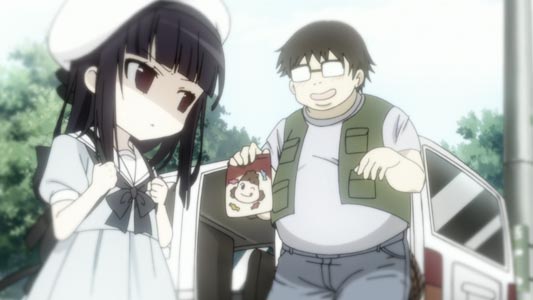
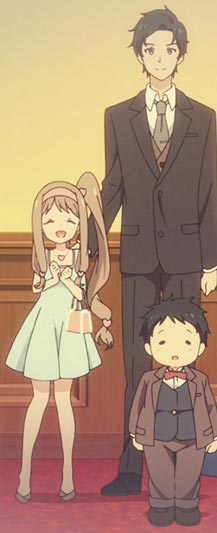
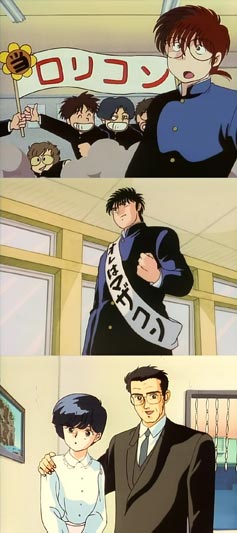
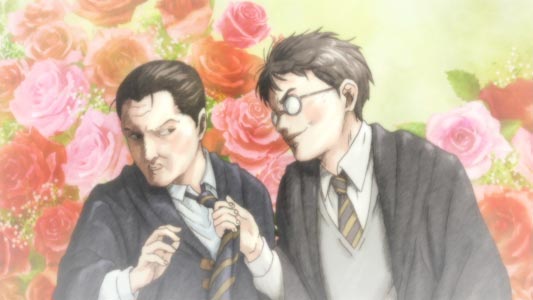
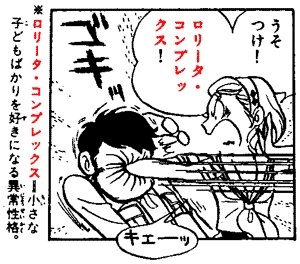
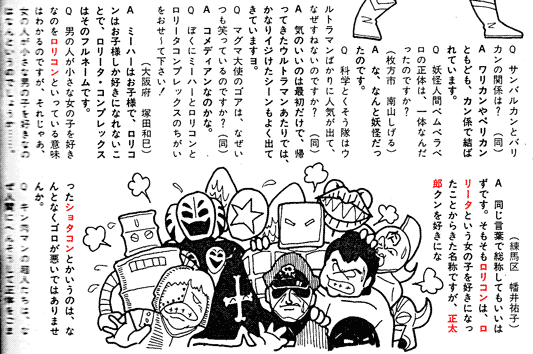
No comments: